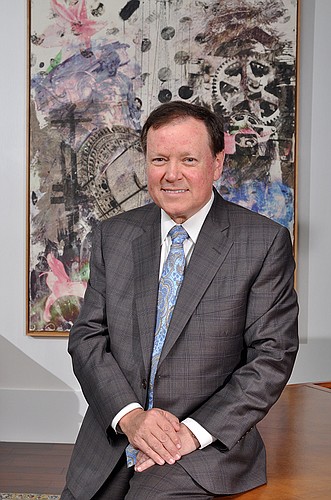- November 24, 2024
-
-
Loading

Loading

Executive: Thomas Moran, managing director of Moran Edwards Management Group
Organization: Naples Children & Education Foundation
Giveback: This is Moran's fourth year serving on the grants committee of the foundation.
Mission: The foundation's mission is to support programs that improve the physical, emotional and educational lives of underprivileged and at-risk children in Collier County. Through the annual Naples
Winter Wine Festival, the foundation has raised more than $123 million since its inception in 2001.
The Naples Winter Wine Festival in late January always gets glamorous publicity from the exclusive guest list and over-the-top auction lots that garner millions of dollars in contributions.
But the 11-member committee that grants the millions of dollars raised at the event takes a business-like approach to the process. It's a strategy that smart donors would be wise to emulate so their charitable contributions can be used most effectively.
After all, the Naples Children & Education Foundation, the organization that organizes the festival, awarded $13.8 million this year to charities that help underprivileged and at-risk children in Collier County.
“It's a lot of money and we want to make sure it gets to the right people,” says Thomas Moran, one of the co-chairs of the foundation's grant committee and the managing director of Moran Edwards Asset Management Group, a Naples-based investment firm that manages more than $3 billion.
Besides Moran, other business executives on the grants committee include Jim Dixon, the president of locomotive engine-parts maker Haynes Corp., and Valerie Boyd Gargiulo, the former president and CEO of Inovis, a professional employee organization.
This year, 54 organizations applied for grants. The foundation granted requests from 30 of those in amounts ranging from $30,000 to Angels Undercover to pay for children's school uniforms to $1 million for the Boys & Girls Club of Collier County to fund academic and youth development in Golden Gate and Immokalee.
To win a grant, a nonprofit has to provide a laundry list of items that resembles a bank-financing application, including: audited financial statements, including the management letter and auditors' notes; tax returns known as IRS Form 990; the most recent balance sheet, income statement and statement of cash flow; a list of the names of the current board; an organizational chart; a list of employees and their salaries; project budgets; and an overview of the mission, programs and populations served.
In addition, an applicant must submit a written project evaluation that tells the committee what they hope to accomplish with the money. For example, an after-school program must show how many more students they'll be able to help and how they will measure success with test scores or other objective data. At least 90% of the funds must reach those in need, not to pay for overhead and fundraising.
Organizations must pass muster with independent charity rating organizations such as Charity Navigator and a similar one established by JP Morgan. “We want to make sure our money has the most impact,” says Moran, who says the committee only selects “best in class” charities. “It's always important to support the best,” he says.
Committee and staff members conduct site visits that include meetings with a nonprofit's board and management. “I like to see full participation by the board,” says Moran. In addition, the committee looks favorably on nonprofit organizations that cooperate with each other and leverage the foundation's donation by seeking matching gifts.
Grants can't be for programs that are duplicative to currently existing ones and the foundation won't fund startups, schools, annual campaigns or religious organizations.
Once an organization wins a grant, it doesn't end there. The committee and foundation staff make visits to the grant recipients, who must provide financial statements and report their progress quarterly. The foundation makes the donation in quarterly installments and it can halt payments if the program isn't meeting expectations. “Sometimes it's being the tough cop,” says Moran.
Grants are awarded each year, so organizations can't be overly dependent on future funding from the foundation. “We have some that have moved to complete financial independence,” says Moran. “That allows others into the queue.”
Follow Jean Gruss on Twitter @JeanGruss